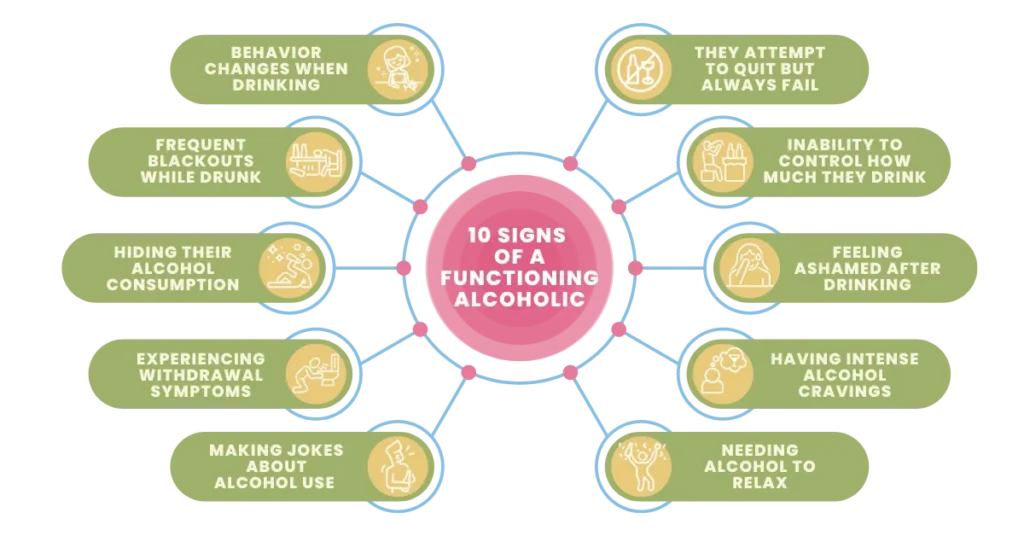Contrary to the popular stereotype of a visibly intoxicated and deteriorating personal life, a functioning alcoholic can seem stable and successful. This is the reality of millions of people who are suffering from alcoholism. These individuals can maintain a sense of normalcy, concealing their addiction despite the ongoing struggle with alcohol abuse. Because of this concealment, it’s crucial to recognize the signs of a functioning alcoholic before they experience devastating consequences.
In this article, we will discuss what alcoholism is, the symptoms of alcoholism, the top 10 signs of a functioning alcoholic, and treatment options for these individuals.
What is Alcoholism?
Alcoholism, or alcohol use disorder (AUD), is a medical condition categorized by an individual’s ability to control or stop alcohol consumption without considering any negative consequences. According to the National Survey on Drug Use and Health, in 2021, 28.6 million people reported having alcohol use disorder. Of those people, 16.3 million reported heavy alcohol use in the past month.
Binge drinking is an aspect of alcoholism. Binge drinking can be defined as consuming five or more drinks for men and four or more drinks for women, with binge drinking for five or more days in one month being considered alcohol abuse. The consequences of heavy alcohol drinking like this can be severe and life-threatening.
To learn about the difference between alcohol addiction and alcohol dependence, read more here.

Symptoms of Alcoholism
Alcoholism can cause a variety of symptoms that can impact an individual’s everyday life. While these symptoms can develop over an extended amount of time, it’s important to recognize them to receive proper alcohol addiction treatment. Some of the most common symptoms of alcoholism include:
- Intense cravings for alcohol
- Inability to control how much alcohol is consumed
- Experiencing severe withdrawal symptoms when not drinking alcohol
- Continued use despite knowing the negative consequences
- Increased tolerance levels
- Withdrawing from social circles, including close family and friends
- Struggles with relapse prevention and an inability to remain sober
What is a High-Functioning Alcoholic?
A high-functioning alcoholic is an individual who appears to have their life under control but is struggling with alcohol addiction or excessive drinking in private. Unlike the stereotypical image of an alcoholic, high-functioning alcoholics can showcase a level of normalcy that can mask the extent of their alcohol abuse. It’s essential to recognize the signs of a functioning alcoholic as it can lead to severe health conditions.

10 Signs of a Functioning Alcoholic
If you suspect that you or a loved one may be a functioning alcoholic, there are some signs to be aware of. Recognizing these signs can be challenging as many individuals strive to keep their addiction hidden and can appear competent and successful in their daily life. Despite this success, individuals can experience significant health issues, social problems, and mental health conditions that are associated with their drinking habits. The ten most common signs of a functioning alcoholic include the following:
- Behavior Changes When Drinking: A functioning alcoholic’s behavior can change significantly while drinking. This can lead to individuals becoming aggressive or engaging in risk-taking behaviors they usually would not do.
- Frequent Blackouts While Drunk: It’s common for alcoholics to have no memory of the previous day because of their alcohol consumption. While they may not seem intoxicated at the time, they cannot remember the events that happened.
- Hiding Their Alcohol Consumption: Functioning alcoholics may hide their alcohol consumption from others. This can be done by drinking in the morning, alone, or at inappropriate times like at work or school. This secretive behavior can be a significant red flag that someone is an alcoholic.
- Experiencing Withdrawal Symptoms After Drinking: Alcoholics will experience withdrawal symptoms once they stop drinking due to the body being unaccustomed to life without alcohol. These symptoms can range from mild to severe, including nausea, headaches, fatigue, tremors, and more.
- Making Jokes About Their Alcohol Consumption: Functioning alcoholics can begin making jokes about their alcohol consumption or not taking it seriously. They can laugh about their alcohol intake and will make light of the situation, being in denial of their condition. If confronted about this, it’s possible they can become hostile or aggressive.
- Needing Alcohol to Relax: Many functioning alcoholics have developed a dependency on their alcohol use and need it to be able to relax or have confidence. This can again lead to them drinking in inappropriate situations or drinking when they did not intend to.
- Having Intense Cravings for Alcohol: Intense cravings are a symptom of alcohol addiction and occurs when individuals try to stop drinking. These cravings can lead to functioning alcoholics to continue to drink, resulting in increased tolerance.
- Feeling Ashamed After Drinking: Since many functioning alcoholics hide a big part of their life, they can feel ashamed after drinking. Because that type of behavior is not what they want people to think of them, as they will work hard to avoid making mistakes. When they do make mistakes, however, they will feel immense remorse, shame, or guilt about their actions.
- The Inability to Control How Much They Drink: One of the most significant signs of a functioning alcoholic is their inability to control how much alcohol they drink. They can never have “just one drink” and tend to drink heavily in any situation.
- They Attempt to Quit But Always Fail: Many functioning alcoholics will attempt to quit drinking but will almost always relapse. This can be from the lack of support or accountability due to the disorder being hidden.
It’s important to note that this is not an exhaustive list of all the signs of a functioning alcoholic. Some individuals may show all or none of these signs, but understanding when they have a drinking problem is vital to maintaining their health. If you believe you or a loved one may be a functioning alcoholic, seek out help from medical professionals.

Treatment Options for a Functioning Alcoholic
Once a functioning alcoholic has reached out for help, finding the proper treatment and support for them is essential. Luckily, there are many different treatment approaches you can try. Alcohol treatment should be catered to an individual’s specific needs, and consulting with a medical professional is best. Some of the most suitable treatment options include:
- Medical Detox: This is a typical first step in treatment for alcohol addiction. Medical detox allows for the individual’s body to remove the toxins of the substance and begin to return to normal. This should be done under the supervision of a professional in a treatment facility.
- Therapy: Therapy, such as cognitive behavioral therapy, can be highly effective in treating alcoholism. This can be one-on-one sessions or group therapy and is done in either inpatient or outpatient treatment facilities.
- Aftercare Services: It’s important to remember that recovery is a life-long process. That is why having the proper aftercare services can help you stay on the path of recovery. These services can include support groups, relapse prevention planning, or ongoing therapy sessions.
Read more about the most effective treatment for alcohol addiction here.

Alcohol Addiction Treatment at Knoxville Recovery Center
It can be challenging to struggle with alcohol addiction or watch someone you care about hide their addiction from you. Recognizing the warning signs that someone may be a functioning alcoholic is essential in ensuring their physical and mental well-being. Once you have recognized those signs, you can begin your path to recovery.
At Knoxville Recovery Center, we provide holistic treatment programs to treat every aspect of addiction and mental health conditions. Unlike other treatment providers, Knoxville Recovery offers medical detox, addiction treatment services, mental health treatment, and a therapeutic nutritional program. Our highly trained medical professionals are dedicated to developing personalized treatment plans for every client, ensuring all clients receive the best care and support possible.
If you or a loved one are suffering from alcohol addiction or substance use disorder, contact us today to learn more about our treatment programs.









